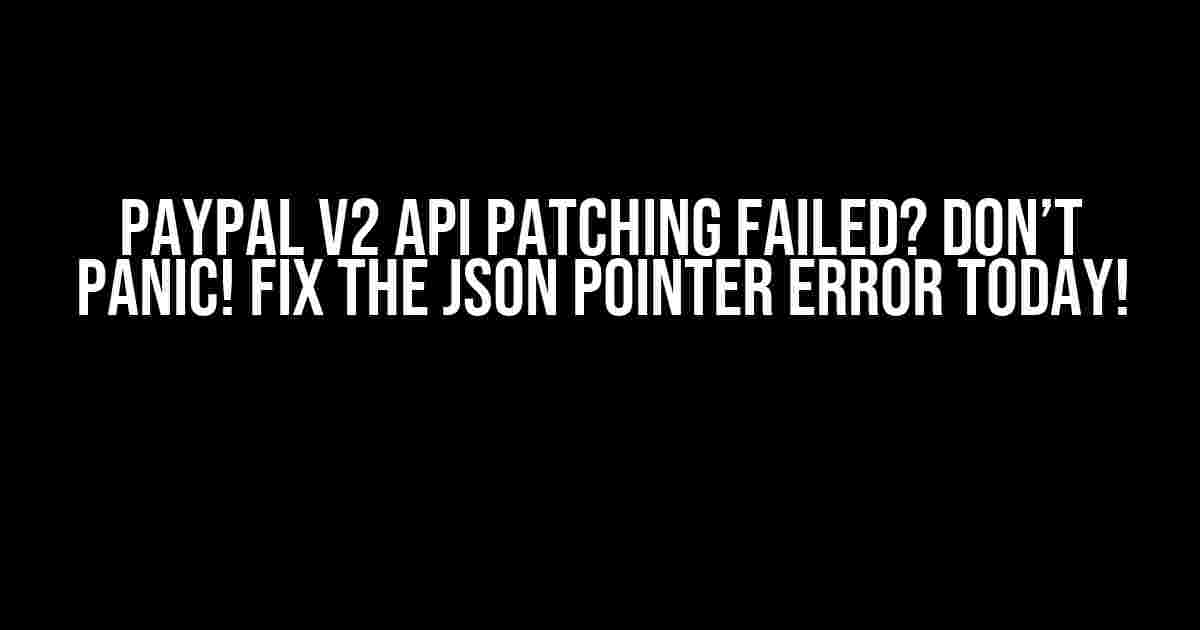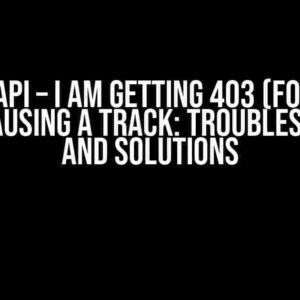Are you tired of staring at the frustrating “Patching failed” error message while trying to integrate PayPal v2 API into your application? You’re not alone! The JSON pointer error can be a real showstopper, but don’t worry, we’ve got your back. In this comprehensive guide, we’ll walk you through the reasons behind this error, and more importantly, provide you with step-by-step solutions to get your PayPal v2 API up and running in no time.
What is the PayPal v2 API Patching Error?
The PayPal v2 API patching error occurs when the API is unable to process the request due to an invalid JSON pointer in the request body. This error can manifest in various ways, such as:
- JSON pointer error: The request body contains an invalid JSON pointer.
- Patching failed: The API was unable to apply the requested changes.
- Invalid request: The request body contains invalid or malformed JSON.
Reasons Behind the PayPal v2 API Patching Error
Before we dive into the solutions, let’s understand the common reasons behind this error:
- Invalid JSON syntax: A single misplaced comma or bracket can cause the entire request to fail.
- Incomplete or malformed JSON pointer: The JSON pointer is used to specify the exact location within the JSON object where the patch should be applied. An incorrect or incomplete pointer can lead to the error.
- Incompatible data types: When the data type of the patch request does not match the expected type, the API will throw an error.
- API rate limiting: If you’re making too many requests within a short period, PayPal v2 API may throttle your requests, leading to patching errors.
Solutions to Fix the PayPal v2 API Patching Error
Now that we’ve identified the common causes, let’s get started with the solutions:
Solution 1: Validate Your JSON Syntax
Use online JSON validators or your favorite code editor’s built-in tools to ensure your JSON syntax is correct. A simple mistake can be easily overlooked, but it can cause the entire request to fail.
<code>{
"op": "replace",
"path": "/address",
"value": {
"address_line_1": "123 Main St",
"address_line_2": "Apt 101",
"admin_area_2": "San Jose",
"admin_area_1": "CA",
"postal_code": "95131",
"country_code": "US"
}
}</code>
Make sure to double-check the JSON syntax, especially when working with complex objects or nested arrays.
Solution 2: Verify Your JSON Pointer
Ensure that your JSON pointer is correctly formatted and points to the exact location where the patch should be applied. A single mistake in the pointer can cause the error.
<code>{
"op": "replace",
"path": "/address/line1", // Correct JSON pointer
"value": "123 Main St"
}</code>
Use online tools or consult the PayPal v2 API documentation to ensure your JSON pointer is correct.
Solution 3: Check Data Type Compatibility
Verify that the data type of the patch request matches the expected type of the target field. Incompatible data types can cause the error.
| Data Type | Example |
|---|---|
| string | “123 Main St” |
| integer | 123 |
| boolean | true |
Solution 4: Handle API Rate Limiting
If you’re making too many requests within a short period, consider implementing a delay between requests or using a queuing system to handle the requests in batches. This will help prevent API rate limiting.
<code>function makeRequest(request) {
// Implement a delay of 500ms between requests
setTimeout(function() {
// Make the API request
}, 500);
}</code>
Best Practices to Avoid PayPal v2 API Patching Errors
To avoid future patching errors, follow these best practices:
- Use a consistent JSON syntax: Stick to a single JSON syntax throughout your code to avoid mistakes.
- Validate JSON pointers: Double-check your JSON pointers before making the API request.
- Test your requests: Test your API requests thoroughly to catch any errors before they cause issues in production.
- Implement error handling: Implement robust error handling to catch and handle errors gracefully.
Conclusion
The PayPal v2 API patching error can be frustrating, but with the right guidance, you can fix it quickly and easily. By following the solutions outlined in this article, you’ll be able to identify and resolve the JSON pointer error, and get your PayPal v2 API integration up and running smoothly. Remember to follow best practices to avoid future errors and ensure a seamless integration.
Don’t let the JSON pointer error hold you back! Get back to building your application with confidence, and remember, we’re always here to help.
Frequently Asked Questions
PayPal API patching got you down? Fear not, friend! We’ve got the answers to your burning questions about those pesky JSON pointer errors.
What causes a JSON pointer error during PayPal v2 API patching?
A JSON pointer error typically occurs when there’s an issue with the path or syntax in your JSON payload. This could be due to a typo, incorrect syntax, or even a missing or extra slash. Make sure to double-check your JSON payload to ensure it’s correctly formatted and the paths are accurate.
How do I identify the specific error in my JSON payload?
PayPal provides an error message that typically includes a JSON pointer to the specific location of the issue. Look for the “details” section in the error response, which should include the JSON pointer. You can also use online JSON validators or tools to help identify the error.
Can I avoid JSON pointer errors by using a specific JSON format?
Yes, PayPal recommends using the JSON PATCH format, which is a standardized format for applying partial updates to a resource. Using this format can help reduce the likelihood of JSON pointer errors. Make sure to follow the PayPal API documentation for specific guidance on JSON PATCH formats.
What are some common JSON pointer errors I should watch out for?
Keep an eye out for errors like mismatched brackets, incorrect property names, or invalid data types. Also, be mindful of trailing slashes, unnecessary whitespace, and mismatched quotes. A single mistake can cause the entire patch to fail.
Are there any tools or resources available to help with PayPal API patching and JSON pointer errors?
Yes, PayPal provides API documentation, code samples, and developer forums to assist with patching and error troubleshooting. You can also utilize online tools like JSON validators, linters, and code editors to help identify and fix errors. Don’t be afraid to reach out to the PayPal developer community for support!


